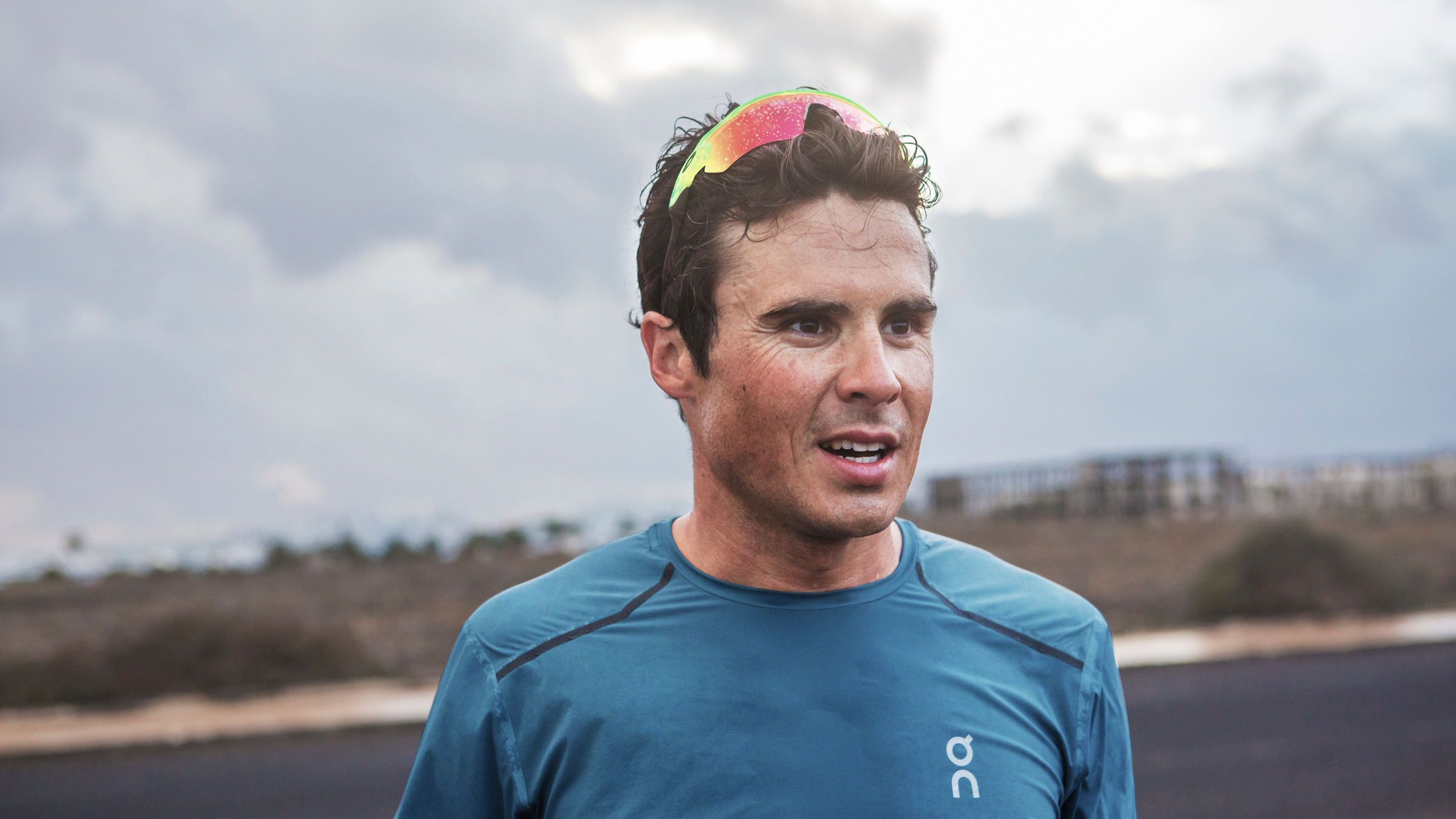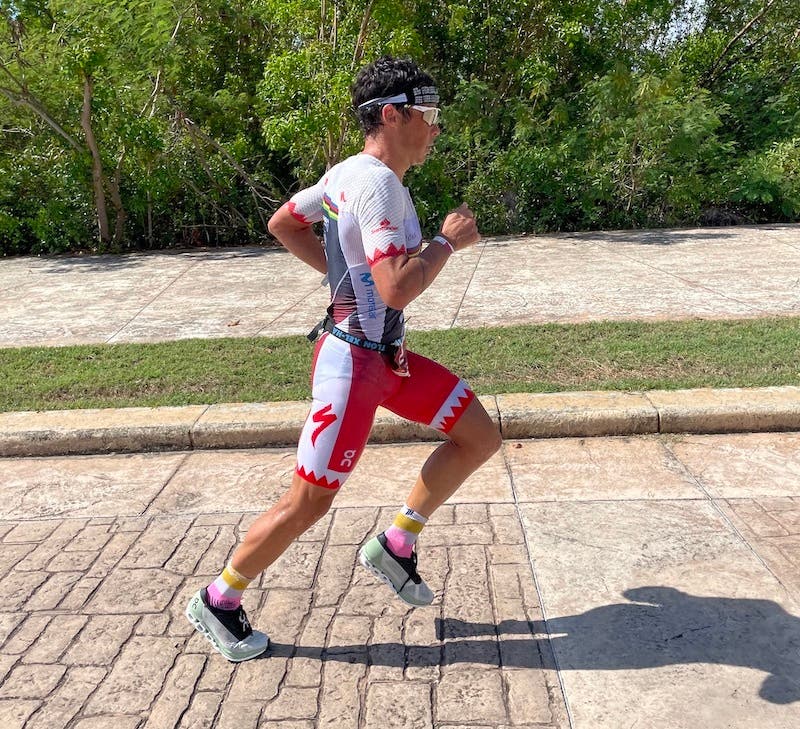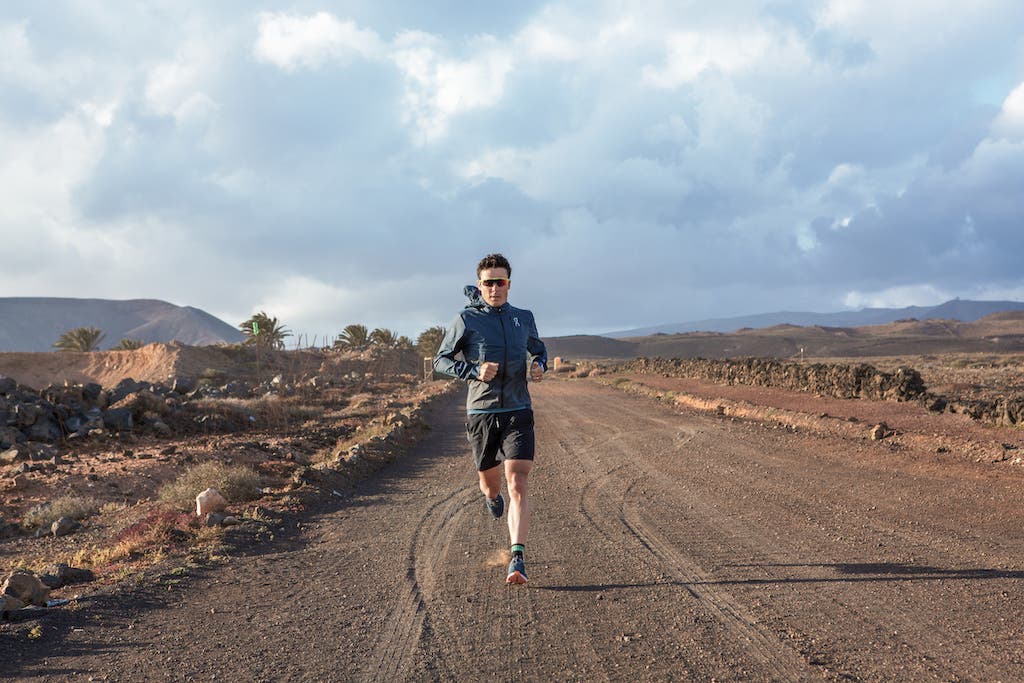Javier Gomez Wants to Medal (Again) at the Olympics

(Photo: On Running)
Spain’s multi-time world champ (and triathlon’s arguable G.O.A.T.) opened up in this conversation about being the “old guy” in Tokyo—and how he’s preparing for one last fight for an Olympic medal. You can see all our Tokyo Olympics coverage here.
Triathlete: Let’s start with why you decided to give the Olympics another go.
Javier Gomez: For the last Olympics in Rio, I broke my elbow one month before the race. That was very frustrating. I didn’t know what to do. I did a year of long distance, but I’ve always loved draft-legal racing. So, at the end of 2018, I decided to put everything into 2020. Having the Olympics postponed wasn’t ideal, but I still feel like I’m competitive and ready to give it one last try. I didn’t want to retire without giving myself another shot at the Olympics.
Triathlete: Sounds like you had some unfinished business.
JG: A little bit, yes. If I had raced and had a good result in Rio, I wouldn’t be racing in Tokyo now.
Triathlete: A recent article on Reuters speaks to the “changing of the guard” in triathlon, and it specifically mentioned you as an older athlete. The writer said, “it seems impossible to imagine [Gomez] going stride for stride” with the likes of Alex Yee, who is 23. What do you think when you hear that? Do you feel like you can contend with guys 13 years younger?
JG: To be honest, I don’t mind what people say, whether it’s good things or bad things. Of course, in most of the races, I wouldn’t beat Alex Yee. He’s of a new generation and he’s very quick. But in Tokyo, we are dealing with a tough course and tough conditions. I truly believe I can still be competitive. My results are there. I am very fit, and I’ve won more races than anyone else. Anything can happen.

Triathlete: And Olympic experience is huge.
JG: There aren’t many great things that come with age. But experience is one of those things. I’ve raced for world titles many times in my career. I’ve had all of the pressure in Beijing and in London, and I am quite comfortable in that situation. Some of the younger guys may feel the pressure more. I know what to expect, I just have to prove it on the day of the race.
Triathlete: When you won Challenge Cancun in early May, you led a podium that included 39-year-old Ruedi Wild and 44-year-old Andy Potts. What kind of statement do you think that made?
JG: The old guys still have it. In many sports, we are seeing great athletes extending their careers. It’s about being motivated to work hard every day, take care of your body more, and you can be at your 100% at any age.
Triathlete: You’ve had resounding success in all types of racing. Is there one style or distance that you prefer?
JG: If I had to choose, it’s draft-legal. It’s the Formula One of triathlon. The highest level of the sport. Even though the long-distance guys are getting better and better, and we are seeing closer finishes, there’s just something about knowing you’ll be racing shoulder-to-shoulder until the end. That being said, I’m excited to go back to longer-distance racing to see what I can do there when I can really focus on training for it.
RELATED: Draft-Legal Racing Matters, Not Just During the Olympics
Triathlete: So once you’ve raced in Tokyo, will you go right back to 70.3 and Ironman?
JG: I’m not sure exactly what I’m going to do, or if I’ll try to go for Kona this year. I’ll see how Tokyo goes. But for sure, I’ll spend the rest of my career at longer distances.
Triathlete: What has your build-up to the Olympics looked like so far? Are you training with your Spanish teammates?
JG: I am training on my own in Cozumel trying to find the same conditions as Tokyo. It’s hot and humid. I am not training with Mario [Mola] or Fernando [Alarza], since they are each with their own groups. I have great friendships with them. We have a really strong team, and are very consistent. I wouldn’t be surprised if any of us end up on the podium in Tokyo.
Triathlete: How hot has it been in Cozumel? Are you acclimated to the conditions?
JG: Even at 6 a.m., 85 degrees F feels like 100, with high humidity, and it’s easy to get dehydrated. It’s good practice, and after a few weeks I get used to it. I’ve been monitoring my core temperature and heart rate specifically so I know how to pace in those conditions. You can’t try to do the same pace when it’s this hot versus when it’s cooler. Hopefully, in Tokyo, I’ll know exactly how to pace myself so I don’t blow up in the last 5K of the run. I’ve trained in Miami and Cancun in the summers to get ready for hot races before, and it makes me feel more confident just to know what to expect and be prepared physically and mentally.
RELATED: Hot Stuff: The History and Science of Heat Acclimation
Triathlete: Looking back at the last 16 months, what was the most challenging part of training through the pandemic?
JG: In Spain, the lockdowns were extremely strict. Especially in the beginning. I have a nice treadmill at home and a trainer, and I tried to keep going and follow my program. But when I realized that there weren’t going to be any races happening, I scaled back and gave my body a break. Then I was nervous I had spent too much time without swimming, so I bought a kiddie pool and swam with resistance bands. I’m not very proud of it [laughs]. It wasn’t a great solution, but it did allow me to be in the water and to practice my stroke. So when I finally got back into the pool, I didn’t feel too bad. It kept me entertained, at least.

Triathlete: And then your wife, Anneke Jenkins, got sick with COVID-19 and you took care of her?
JG: Yes, in January. Luckily, she didn’t feel too bad—just a slight fever. But she still had to be isolated in the house. And I tested negative, somehow, but also had to isolate in another part of the house for 14 days. I made her meals and left them at the door for her. It was a crazy and challenging time as an athlete and a person.
Triathlete: Racing aside, what are your expectations for the Olympic experience this year?
JG: It’ll be different for sure. With all of the restrictions and protocols, and not being able to have family or friends there, it won’t be the same. We won’t have the chance to enjoy the Olympics much the way we have before. But I’ll just be focusing on the race. I’ll be there to perform, and go home.
Triathlete: Have you experienced living in a “bubble” before a race yet?
JG: Yes, in Leeds we couldn’t leave the hotel room. It’s not very enjoyable. When you’re an athlete, you want to explore and check out the area. Preparing for a race from a hotel room isn’t ideal, but it’s the only way.
Triathlete: Can you articulate what it means to be at this stage in your career, at 38, and now going to your third Olympic Games?
JG: I’m incredibly proud of what I’ve accomplished and where I am now. As an athlete, you’re always thinking about the next race and the next race after that without slowing down to reflect about what you have achieved. The journey has been incredible, but it’s not over. People may see me as an old guy trying to race in the Olympics, and yes, the younger guys may have a better chance. But as I proved in 2019, the last time we had a proper world championship, that I can still podium. I was already 36 then—two more years won’t make such a difference. I’ve been on top since the beginning of my career, and that’s where I want to stay. The day I don’t feel competitive, I’ll give it up.